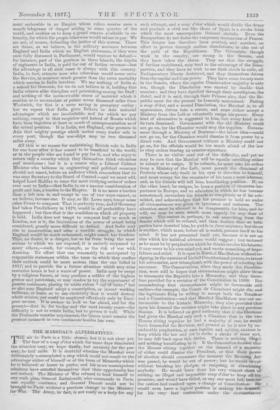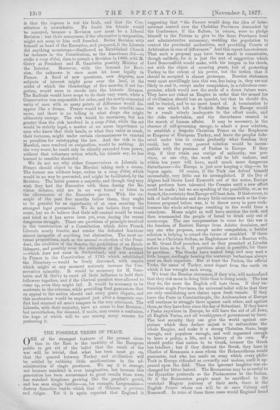THE MARSHAL'S ALTERNATIVES.
THE air in Paris is a little clearer, but it is not clear yet. The fear of a coup cre'tatwhich for sonic days dominated the situation may, we hope finally, but certainly for the pee- sent, be laid aside. It is doubtful whether the Marshal ever deliberately contemplated a step which could not result to the advantage either of himself or of the form of Monarchy which he is believed at heart to prefer, and his more unscrupulous admirers have satisfied themselves that their opportunity has not arrived. The Minister of War refused to lend himself to any such plan, General Ladmirault, who commands in Paris, war equally obstinate, and General Ducrot could not be brought to Paris without a previous change in the Ministry for Wiir. The Army, in.. fact, is not ready as a body-for any such attempt, and a coup d'e'tat which would divide the Army and produce a civil war like these of Spain is a stroke from which the most unscrupulous General shrinks. Even the Bonapartists do not desire the temporary destruction of Prance. This danger has therefore been averted, and another, an effort to govern through endless dissolutions, is also out of the path of the Republicans. The Orleanists, though weak in the country, are strong in the Senate, and they have taken the alarm. They see that the struggle; if further embittered, may tend to the advantage of the Bona- ! partists, and they have no wish to see their chiefs in exile, all Parliamentary liberty destroyed, and they themselves driven I from the capital and from power. They have some twenty seats in the Senate, where the regular Conservative majority is only ten, though the Dissolution was carried by double that number ; and they have signified through their mouthpiece, the Soleil, and it is said, through their Princes also, that the Re- public must for the present be honestly maintained. Failing a coup d'ebt, and a second Dissolution, the Marshal is, to all appearance, driven into a corner, and must either accept a Ministry from the Left or voluntarily resign his power. Every kind of alternative is suggested to him, but every kind is in its turn dismissed. Government with the old Ministry could not go on, for the Chamber would stop the supplies. Govern- ment through a Ministry of Business—the latest idea—could not go on, for the Chamber would dismiss it from power by a direct vote. And Government without a Ministry could not go on, for the officials would be too much afraid of the law to obey orders bearing no counter-signature. There is no visible road out of the difficulty, and yet we may be sure that the Marshal will be equally unwilling either to submit or to resign. If he submits, he must take his orders from a Ministry of the Left, must permit the dismissal of Prefects whose only fault in his eyes is devotion to himself, and must occupy for the remainder of his term a most irksome; and, as his friends will tell him, humiliating position. If, on the other hand, he resigns, he loses a position of immense,ins- portance in Europe, and an adulation to which he has become accustomed, surrenders his friends as completely as if he sub- mitted, and acknowledges that his promise to hold on under all circumstances was given in ignorance and rashness. The situation must be allowed to be disagreeable for him, and li€. will, we may be sure, search most eagerly for any door of escape. The easiest is, perhaps, to ask something from the- Senate which will be refused, and then deolare that as both parties have deserted him, he yields to force nzajeure; but-there, is another, which must, before all is ended, present itself to his mind. It has not presented itself yet, because it is not an idea which his habitual advisers would suggest ; but tortured as he must be by perplexities which he thinks involve his honour, it may recur to his own mind yet, and excite something of hope- fulness and relief. It is open to Marshal Madelahon without re- signing, in the exercise of his full Constitutional powers, to invest his adversaries, now triumphant, with the power of selecting his successor. The Conservatives, when they made the Constltn- tion, were still in hopes that circumstances might allow them to transmute the Republic into a Monarchy, and they there.- fore provided for a revision of the Constitution in 1880; But- remembering that circumstances might be favourable still an earlier—for example, the ComtedeacCchepaitnbboortchl might t hedie,Tricolour , d the legitimate King be willing to and a Constitution—and that Marshal MacMalion was not un- favourable to the historic Monarchy, they also provided that upon his demand the revision might take place in any previous Session. It is believed on good authority that if the Elections had given the Marshal only such a Chamber that in the two, Houses sitting together he had a majoiity of one; he would have demanded the Revision, and pressed as he is now by un- endurable perplexities, at once legalist and soldier, anxious to keep within the law and yet to strike a stroke of some sort, lie may fall back upon this device. There is nothing Metal and nothing humiliating in it. If the Convention decided that the Houses sitting together on the demand of a Majority of either could dismiss the President, or that their pmeer, of election should commence the moment the Revising Act was passed, he would be out of power; but he would be out- without breaking his pledges, or resigning, or abandoning anybody. He would have done his very utmost' shot of striking an illegal and impossible coup de'tat to keep AVMs promises, and would have failed, as any one must fail; beeturste the nation had resolved upon a change of Constitution:. Hie. • would even have a. logical 'position in making his demote,- for his very best' contention under the cireinnetancee is that the impasse is not his fault, and that the Con- stitution is unworkable. No doubt his friends would be annoyed, because a Revision now must be a Liberal Revision ; but their annoyance, if the alternative is resignation, might not seem to him well founded. Better Revision with himself as head of the Executive, and prepared, if the Liberals did anything monstrous—disallowed an Established Church for instance in ' the Constitution, as the Americans did—to strike a coup d'itat, than to permit a Revision in 1880, with M. Grdvy as President and M. Gambetta possibly Minister of the Interior. Moreover, with the demand for Revi- sion, the unknown is once more let loose legally in France. A flood of new questions, new disputes, new subjects of interest might pour over the land, in the midst of which the blunderings of five months, if not for- gotten, would seem to recede into the historic distance. The Radicals would have scope to do their very worst, while a Conservative was responsible for order, and the newly-cemented unity of men with so many points of difference would dis- appear like a dream. France would be in the crucible once more, and there is no telling in what shape she might ultimately emerge. The risk would be enormous, but not greater than the risk involved in a coup cre'tat, while the act would be strictly legal, a matter of no mean importance to men who know that their heads, or what they value as much, their fortunes, might under certain circumstances be exacted as penalties for outstepping the law. And the risk to the Marshal, once resolved on resignation, would be nothing. At the very worst, he could only be silently extruded from power, without that voluntary action which, his friends say, he has learned to consider shameful.
We do not see why either Conservatives or Liberals in France should object to the Marshal taking such a course. The former are without hope, unless in a coup d'e'tat, which would in no way be prevented, and might be facilitated, by the Revision. The latter possess a majority, and though they may wish they had the Executive with them during the Re- vision debates, still are in no way bound to listen to the allurements of the Executive power. With the ex- ample of the past five months before them, they ought to be grateful for an opportunity of at once securing the strongest legal guarantees. We do not believe they would resist, but we do believe that their self-control would be taxed and tried as it has never been yet, even during the recent dangerous struggle. There are questions of principle involved in the construction of a Constitution which drive French Liberals nearly frantic, and render the defeated fractions almost incapable of anything but abstention. The most ex- treme propositions, such as the annual re-election of the Presi- dent, the abolition of the Senate, the prohibition of an Estab- lishment, and possibly even the extinction of the Presidency —which does not exist in Switzerland, and was avoided in France in the Constitution of 1795 which established the Directory — would be freely discussed, with results which might at any moment seriously increase the Con- servative minority. It would be necessary for M. Gam- betta and M. Gr4vy to exert all their influence to hold their followers together, and if the Clerical question were allowed to come up, even they might fail. It would be necessary to be moderate in the extreme, while providing final guarantees that an appeal to the nation should end every grave dispute, and this moderation would be required just after a desperate con- flict had strained all men's tempers to the very uttermost. The Liberals, with their majority, have no cause to fear Revision ; but nevertheless, the demand, if made, may create a confusion, the hope of which will be one among many reasons for preferring it.



































 Previous page
Previous page